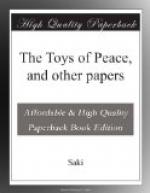“We don’t seem to get much further in our search for the probable winner,” said Mrs. de Claux; “the more I listen to you experts the more hopelessly befogged I get.”
“It’s all very well to blame us,” said Bertie to his hostess; “you haven’t produced anything in the way of an inspiration.”
“My inspiration consisted in asking you down for Derby week,” retorted Mrs. de Claux; “I thought you and Odo between you might throw some light on the question of the moment.”
Further recriminations were cut short by the arrival of Lola Pevensey, who floated into the room with an air of gracious apology.
“So sorry to be so late,” she observed, making a rapid tour of inspection of the breakfast dishes.
“Did you have a good night?” asked her hostess with perfunctory solicitude.
“Quite, thank you,” said Lola; “I dreamt a most remarkable dream.”
A flutter, indicative of general boredom; went round the table. Other people’s dreams are about as universally interesting as accounts of other people’s gardens, or chickens, or children.
“I dreamt about the winner of the Derby,” said Lola.
A swift reaction of attentive interest set in.
“Do tell us what you dreamt,” came in a chorus.
“The really remarkable thing about it is that I’ve dreamt it two nights running,” said Lola, finally deciding between the allurements of sausages and kedgeree; “that is why I thought it worth mentioning. You know, when I dream things two or three nights in succession, it always means something; I have special powers in that way. For instance, I once dreamed three times that a winged lion was flying through the sky and one of his wings dropped off, and he came to the ground with a crash; just afterwards the Campanile at Venice fell down. The winged lion is the symbol of Venice, you know,” she added for the enlightenment of those who might not be versed in Italian heraldry. “Then,” she continued, “just before the murder of the King and Queen of Servia I had a vivid dream of two crowned figures walking into a slaughter-house by the banks of a big river, which I took to be the Danube; and only the other day—”
“Do tell us what you’ve dreamt about the Derby,” interrupted Odo impatiently.
“Well, I saw the finish of the race as clearly as anything; and one horse won easily, almost in a canter, and everybody cried out ’Bread and Butter wins! Good old Bread and Butter.’ I heard the name distinctly, and I’ve had the same dream two nights running.”
“Bread and Butter,” said Mrs. de Claux, “now, whatever horse can that point to? Why—of course; Nursery Tea!”
She looked round with the triumphant smile of a successful unraveller of mystery.
“How about Le Five O’Clock?” interposed Sir Lulworth.
“It would fit either of them equally well,” said Odo; “can you remember any details about the jockey’s colours? That might help us.”




